Bulletproof coffee: Would you add butter to your brew?
- Published
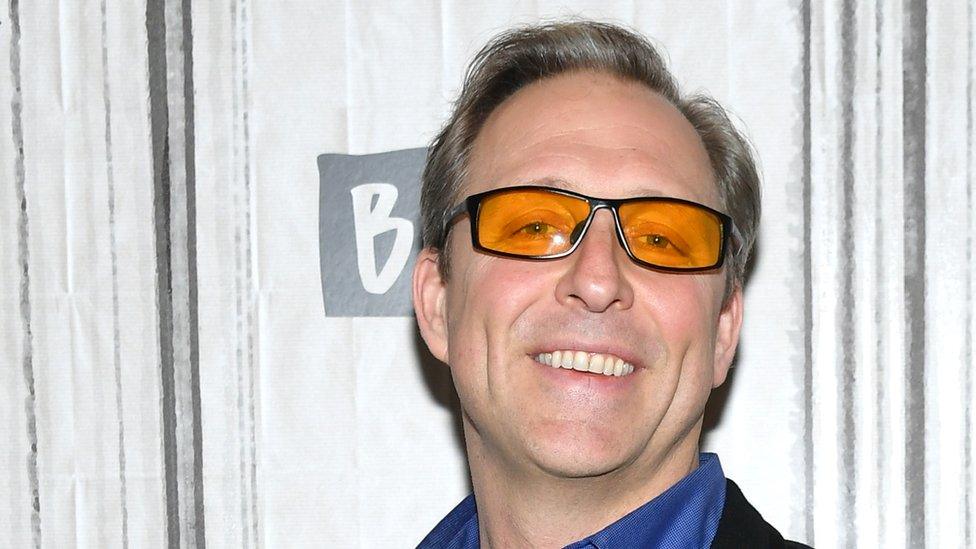
Mr Asprey says that his butter coffee drink helped him to change his life for the better
The BBC's weekly The Boss series profiles different business leaders from around the world. This week we speak to Dave Asprey, founder of cult US coffee brand Bulletproof.
Dave Asprey plans to live until he is 180 years old. No, really, he is being serious.
"I don't think it is science fiction at all," says the 45-year-old. "Someone's got to do it, and I'm willing to die trying."
While many people would describe Mr Asprey as "eccentric", he calls himself the "world's first professional biohacker".
A biohacker is someone who uses science and technology to try to improve their health by "hacking" their biology, often doing things that the rest of us would consider a bit mad.
And Mr Asprey's regime doesn't disappoint. His quest for immortality sees him have part of his bone marrow removed every six months, so that some of his stem cells can be extracted, and then injected all over his body.
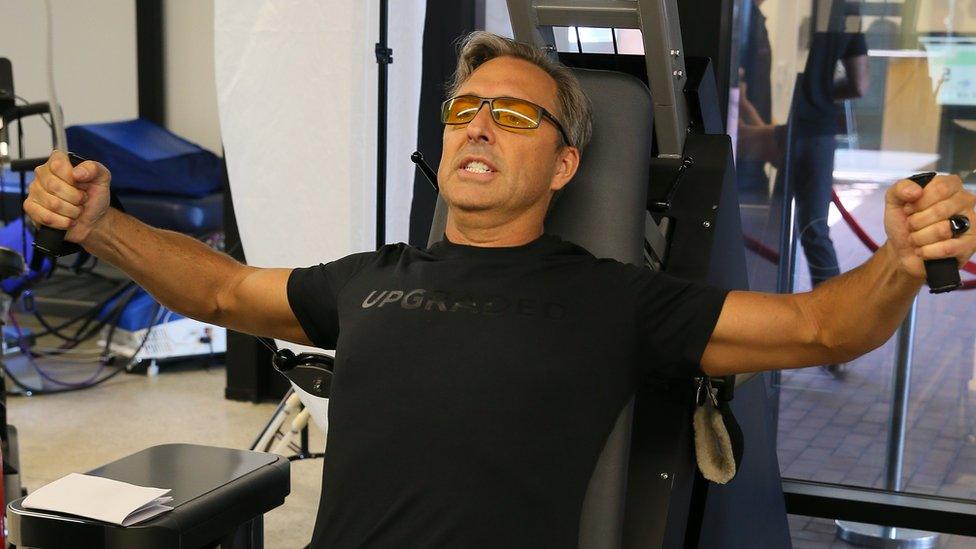
Mr Asprey also maintains a strict exercise regime
He also spends time in a cryotherapy chamber that uses liquid nitrogen to chill his body, "bathes" himself in infrared light, and attaches electrodes to his head.
Mr Asprey says he has now spent more than $1m (£800,000) on improving his body and brain function in such ways. This financial outlay has been made possible due to the continuing popularity of his best-known, self-claimed biohack - his popular Bulletproof coffee brand.
A Bulletproof coffee has an unusual recipe that requires you to buy three separate products. It is a black coffee into which you add butter and a purified form of coconut oil.
While you can simply add any butter, and any coconut oil, to any coffee, to make a generic Bulletproof, Mr Asprey's company Bulletproof 360 will sell you the original, official version. The composite parts are widely available across the US, and internationally.
He claims that the drink can help improve a person's physical and mental health, and it certainly has its fans.
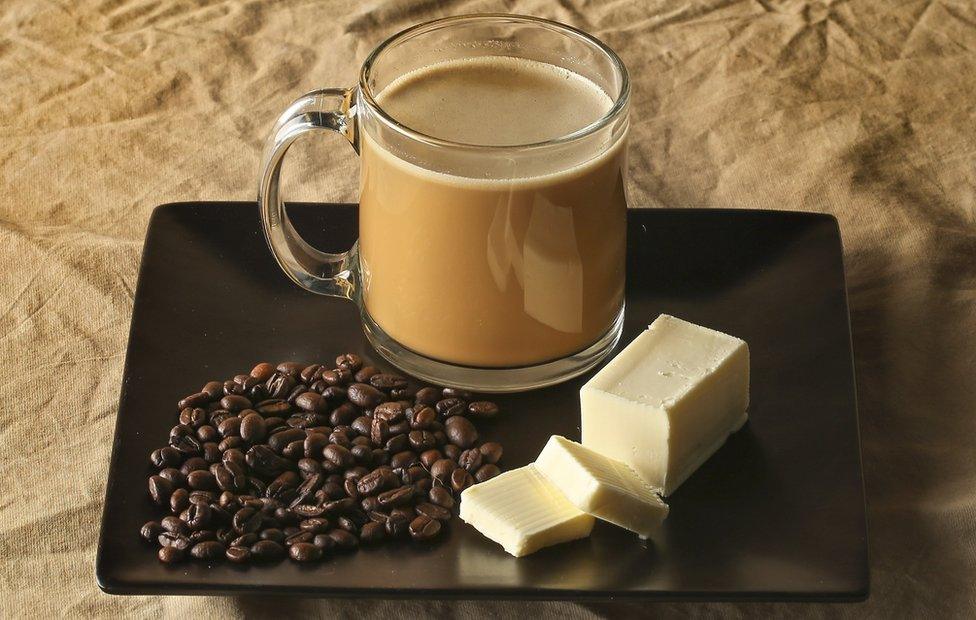
Bulletproof coffee involves adding butter to your brew
Since Mr Asprey started selling the drink and its composite parts back in 2012, he estimates that more than 160 million cups have been consumed, with celebrity fans including US TV chat show host Jimmy Fallon and actor Shaline Woodley.
This success has seen Seattle-based Bulletproof 360 attract more than $68m in investment,, external and expand into a wider food and lifestyle brand that will sell you everything from protein bars, to T-shirts and diet books.
But for all his supporters, Mr Asprey has faced criticism from many others, especially from some health industry professionals. They point to the fact he has no medical qualifications, or nutritional training. And they say that adding butter to coffee is not healthy.
Mr Asprey got the inspiration for Bulletproof coffee back in 2004 when he was travelling in Tibet.
Born in New Mexico in 1973, he had carved out a successful career as an IT executive in Silicon Valley. But over the years he had become overweight, and fallen into bad health. At his heaviest he says he weighed 300lbs (21 stone; 136kg).

Mr Asprey was inspired by a trip to Tibet
As part of a quest to improve his wellbeing, he went to Tibet to learn how to meditate. During a trek in the mountains, he was offered a cup of tea infused with yak butter. Native to the Himalayas, the yak is a long-haired relative of the bison and buffalo.
"After I drank it I noticed my brain felt much better than it had in a long time, even though I should have felt bad at that elevation," he says.
After returning home to California, Mr Asprey started experimenting to make his own version of the drink.

More The Boss, external features:

As yaks are thin on the ground in the US, he concluded that butter made with milk from grass-fed cows worked best. And that coffee was more effective than tea. To finish his drink he added what he calls "brain octane oil". This is a purified form of coconut oil called medium-chain triglyceride oil.
Mr Asprey says his invention - which he has for breakfast every day - helped to "change my life, and allowed me to lose 100lbs".
He shared his discovery by blogging about it in 2009. Three years later he started to sell the three ingredients of his Bulletproof coffee online.
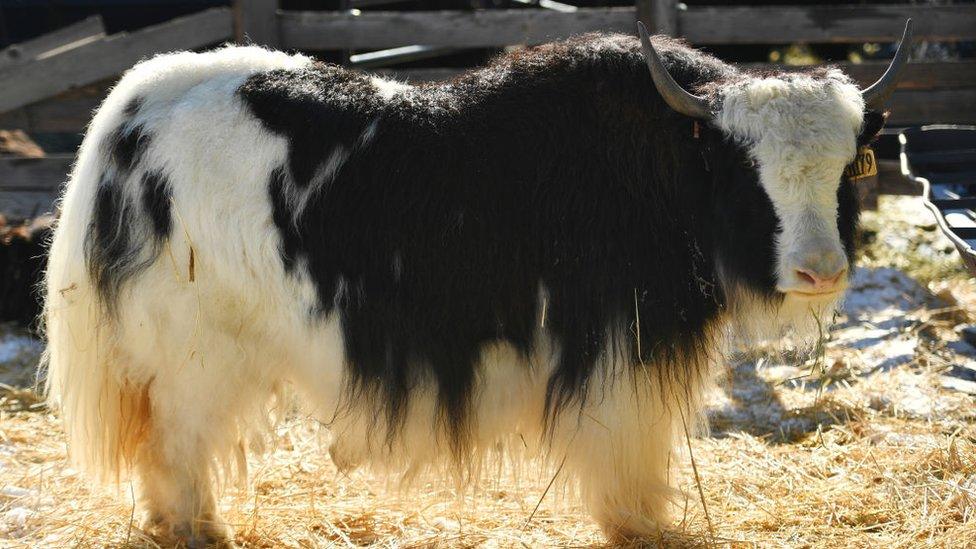
Rather than butter made from milk from a yak (pictured), Mr Asprey uses cow's butter
The first outside funding came from venture capital firm Trinity Ventures, which was also an early investor in Starbucks. Mr Asprey had an advantage in that he knew some of the key people at Trinity.
"I walked in and said... I'm friends with you, and you should personally give me $50,000 so I can raise a little money for coffee inventory," he says. They gave him $9m instead.
While sales of Bulletproof's products grew steadily, in 2016 they got a major jump when they started to be stocked by upmarket US supermarket chain Whole Foods Market.
Jonny Forsyth, associate director of food and drink at research group Mintel, says that while question marks remain over Bulletpoof's coffee's health claims, the brand has been very influential.
"The science behind butter coffee's health benefits remains hazy," says Mr Forsyth. "But it locks in to a powerful consumer narrative - that it will deliver a cleaner coffee drinking experience, and imbue drinkers with 'healthier', more powerful and more sustainable energy levels."
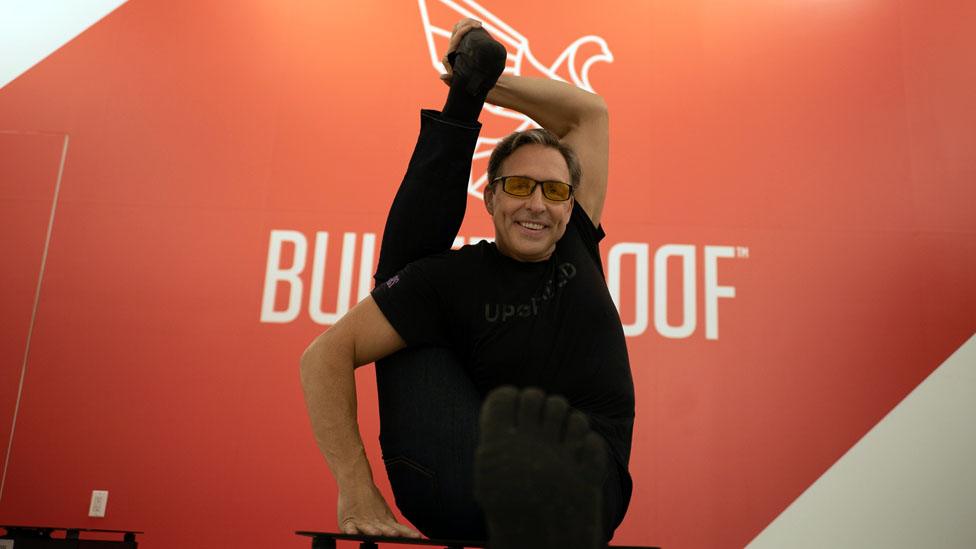
Mr Asprey defends his drink from criticism
However, Aisling Pigott, a registered dietician, and spokesperson for the British Dietetic Association (BDA), is critical.
"Bulletproof coffee is not something I'd ever recommend, because it's introducing extra calories and extra fat in a way that isn't providing any other nutritional value," she says.
"There is no benefit to adding butter to your coffee. With a Bulletproof coffee-based breakfast you're missing out on what you're getting from a food-based breakfast - there is no protein, vitamins or minerals."
Mr Asprey says he is unconcerned by such criticism, and points to other health professionals who say that diets high in fat - and low in sugar - are good for you.
"I had arthritis in my knees, I'd been diagnosed with chronic fatigue syndrome, I had cognitive dysfunction, I was at high risk of stroke or heart attack, I was pre-diabetic and I felt terrible all the time," he says. "I undid all of that."
He adds that unlike more modern diets, his drink is based on ancient Tibetan custom. "I'm okay being part of a 4,000-year-old fad," he says.